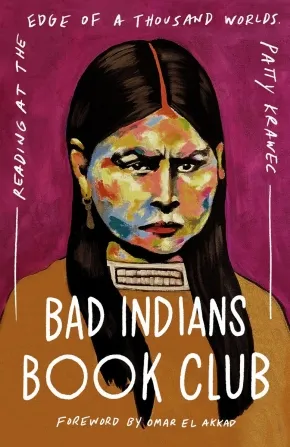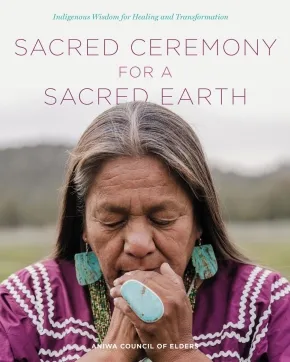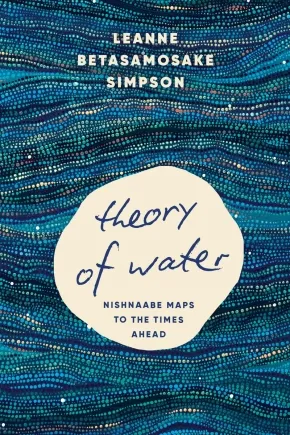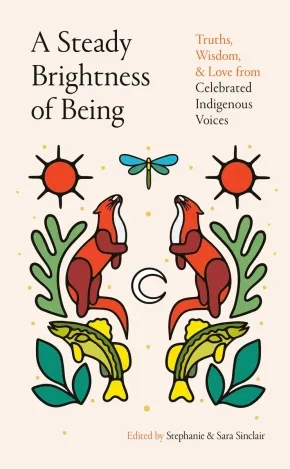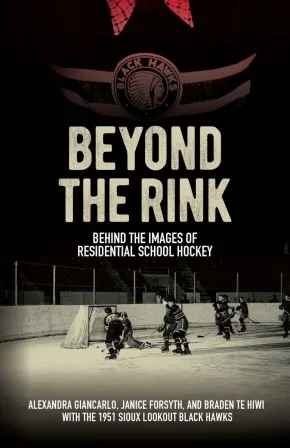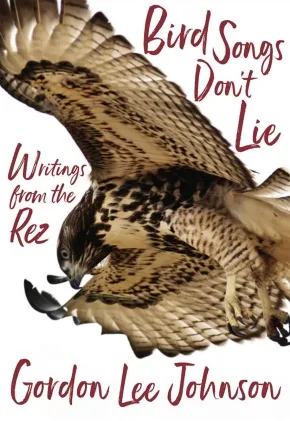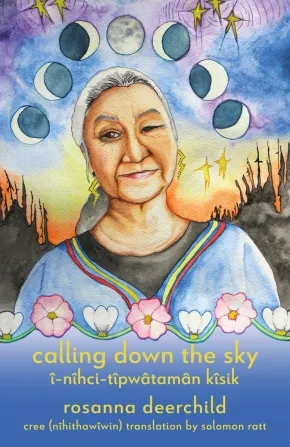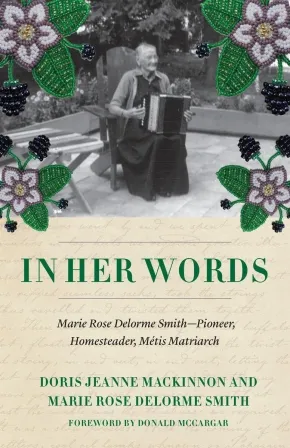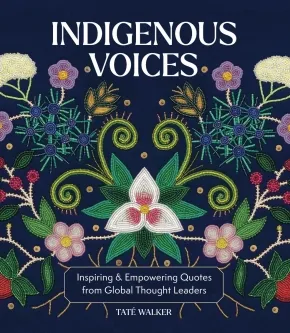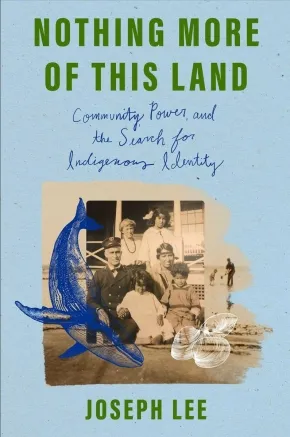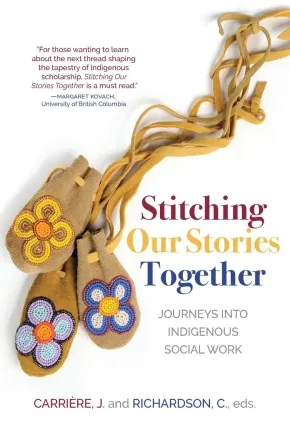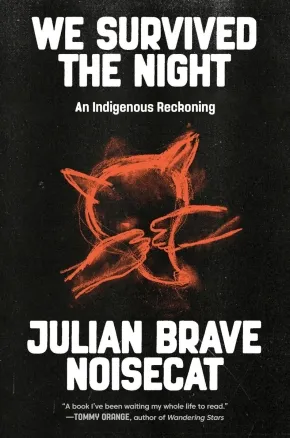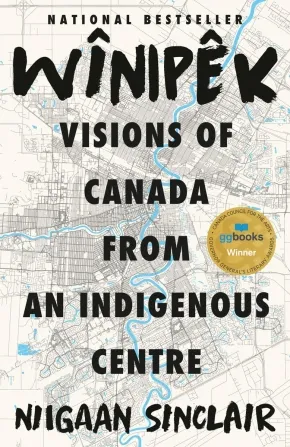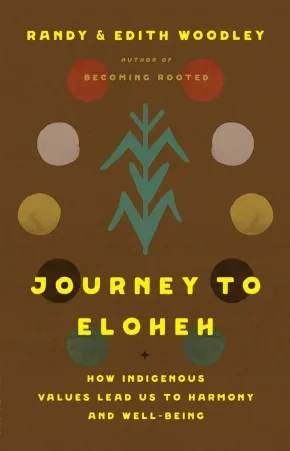
Indigenous Narratives
1
-
15
of
95 Results;
Sort By
Go To
of 7
FLASH SALE! Bad Indians Book Club: Reading at the Edge of a Thousand Worlds
$19.50 $26.00
Format:
Paperback
Text Content Territories:
Indigenous Canadian; First Nations; Anishinaabeg; Ojibway; Lac Seul;
Reading Level: N/A
ISBN / Barcode: 9781773104614
Synopsis:
Synopsis:
In this powerful reframing of the stories that make us, Anishinaabe writer Patty Krawec leads us into the borderlands to ask: What worlds do books written by marginalized people describe and invite us to inhabit?
Patty Krawec doesn’t want to be a “Good Indian.” When a friend asked what books could help them understand Indigenous lives, Patty Krawec gave them a list. This list then exploded into a book club, then into a podcast about a year of Indigenous reading, and then, ultimately, into this book.
Drawing on conversations with readers and authors, Bad Indians Book Club delves into writing about history, science, and gender, and into memoirs and fiction, all by “Bad Indians” and those like them, whose refusal of the dominant narrative of the wemitigoozhiwag (European settlers) opens up new possibilities for identity and existence.
Introducing each chapter with flash fiction about a shapeshifting Deer Woman, who is on her own journey to decide who she is, Krawec leads us into a place of wisdom and medicine where stories of and by marginalized writers help us imagine a thousand worlds waiting to be born.
Reviews
“Bad Indians Book Club is a compendium of worlds. From a lifetime of reading, there emerges a marriage of tapestry and map, a vision of the literary canon not as some secret handshake of the correctly educated but as a living, growing organism. . . There’s a dangerousness to a book like this. It’s not enough to define the Good Indian, the Grateful Immigrant, the Untroublesome Minority. Nor is it enough to simply reject these designations. One must interrogate how they came to hold so much power, how they offer the willing participant so many crumbs of reward from colonialism’s table.”— Omar El Akkad, author of One Day, Everyone Will Have Always Been Against This, September 2025
“Bad Indians Book Club is like a kind and protective auntie guiding you through a sometimes hostile world with sheer wisdom and wit. It’s a resounding rallying cry for our stories and our peoples. There’s no other book club I’d want to be in!”— Waubgeshig Rice, author of Moon of the Turning Leaves, September 2025
“This genre-crossing, shape-shifting, imagination-expanding book is for all who love to, and also need to, read. We tell stories to live, and this enlivening book reflects on all kinds of stories, each page suffused with Patty Krawec’s unmistakable voice and generous, timeless wisdom.”— Astra Taylor, author of The Age of Insecurity: Coming Together as Things Fall Apart, September 2025
“I didn’t want the Bad Indians Book Club to end. I read it at the perfect time, when snow was on the ground, in a period of rest and renewal. Patty Krawec made me wonder and made me ponder. Her book is a call to action to be curious, vigilant, to listen to and receive the inner strength of the land, to create and recreate community, to agitate, to investigate, to take story into ourselves and to hold the teachings sacred. As she guides us, throughout the book she tells us a new, sustaining, serial story about Kwe, Deer Woman. Such a gift. There is so much goodness in The Bad Indians Book Club!”— Shelagh Rogers, Shelagh Rogers, Truth and Reconciliaton Commission Honorary Witness, recovering broadcast journalist, September 2025
“Bad Indians Book Club is full of good medicine — challenging us to ask questions and bringing us home to ourselves. As Patty Krawec guides us into the deep wisdom wells of many people who journey in kinship, we consider how to hold the curiosity of care and stories, and what it means to imagine and create a future that integrates all our stories into a web of healing. Please buy this book, and celebrate the power of story in a weary yet flourishing world.”— Kaitlin B. Curtice, author of Living Resistance, September 2025
“In Bad Indians Book Club, Patty Krawec provides critical space for the ne'er-do-wells, disrupters, red sheep, box-busters, tricksters, and all us rowdy relatives defying expectations. Indigenous people have always been proverbial thorns in the sides of colonizers, and this piercing book does an incredible job of letting the air out of today’s imperialist narratives.”— Taté Walker, Two Spirit Lakota storyteller and community-builder, September 2025
“With Bad Indians Book Club, Patty Krawec gifts us a compelling investigation into the power of not just reading books but also doing so in community. Krawec makes the case for building your circle through reading, as a way of being in better relations with all our kin, including the land. Thinking deeply alongside other books, Bad Indians Book Club is a needed guide at a moment when books are under attack. Books are not just written culture, they are also oral culture, and Krawec illuminates this beautifully.”— Chanda Prescod-Weinstein, author of The Disordered Cosmo, September 2025
Additional Information
232 pages | 6.00" x 9.00" | Paperback
FLASH SALE! Sacred Ceremony for a Sacred Earth: Indigenous Wisdom for Healing and Transformation
$39.75 $52.99
Format:
Hardcover
Text Content Territories:
Indigenous;
Reading Level: N/A
ISBN / Barcode: 9780760392126
Synopsis:
Synopsis:
For the first time, over a dozen respected Indigenous elders from around the world have united to share their timeless wisdom beyond their lands and lineages.
Aniwa’s Council of Elders includes some of the globe’s most renowned Indigenous Wisdom Keepers. In a time fraught with ecological, social, political, and mental health crises, they share a mission to unite people of all races, colors, and creeds to promote healing and a deeper reciprocal relationship with our planet. Sacred Ceremony for a Sacred Earth brings together their profound teachings, stories, sacred ceremonies, and healing practices, amplifying the voices of Indigenous healers from diverse traditions.
In their worldview, we are all children of Mother Earth, destined to return to her embrace. This extraordinary book serves as a guiding light, beckoning humanity back to ancestral wisdom and restoring forgotten bonds with nature and self through ceremonies and practices.
Embark on a journey of self-discovery, unveiling the purpose of your soul and reclaiming your intrinsic relationship with Mother Earth, through ancient practices such as:
- Use of Feathers to Bless Yourself and Relieve Pain
- Pagamento for Trees
- Hopi Message of Comfort to Say Good-Bye to Loved Ones Who Have Passed
- Practices for Conscious Conception
- Create a Spiritual House for Your Inner Child
- The Feagaiga (Sacred Promise or Covenant) with Mother Earth
- Connect with Your Ancestors
Sacred Ceremony for a Sacred Earth calls upon us to awaken and rekindle the flame of connection with our roots and the natural world. Let the eternal wisdom of elders guide you toward healing, growth, and a profound reconnection with nature.
Reviews
"An essential guide to begin understanding culture, nature, and yourself."—Oona Chaplin, actress
"Beautifully and profusely illustrated throughout with full color photography of indigenous people, rituals, events, Sacred Ceremony for a Sacred Earth is informative, fascinating, insightful, and unreservedly recommended."—Midwest Book Review
Educator Information
Discover rituals and wisdom from Indigenous communities across the globe that, until now, have only been passed down orally and taught within closed circles.
Additional Information
224 pages | 8.30" x 10.25" | Hardcover
FLASH SALE! Theory of Water: Nishnaabe Maps to the Times Ahead
$26.25 $35.00
Format:
Hardcover
Text Content Territories:
Indigenous Canadian; First Nations; Anishinaabeg; Ojibway; Mississaugas; Alderville First Nation;
Reading Level: N/A
ISBN / Barcode: 9781039010246
Synopsis:
Synopsis:
Acclaimed Nishnaabeg writer Leanne Betasamosake Simpson takes a revolutionary look at that most elemental force, water, and suggests a powerful path for the future.
A genre-bending exploration of that most elemental force-water-through Indigenous storytelling, personal memory, and the work of influential artists and writers.
For many years, Leanne Betasamosake Simpson took solace in skiing--in all kinds of weather, on all kinds of snow across all kinds of terrain, often following the trail beside a beloved creek near her home. Recently, as she skied on this path against the backdrop of uncertainty, environmental devastation, rising authoritarianism and ongoing social injustice, her mind turned to the water in the creek and an elemental question: What might it mean to truly listen to water? To know water? To exist with and alongside water?
So began a quest to understand her people's historical, cultural, and ongoing interactions with water in all its forms (ice, snow, rain, perspiration, breath). Pulling together these threads, Leanne began to see how a "Theory of Water" might suggest a radical rethinking of relationships between beings and forces in the world today. In this inventive work, Simpson draws on Nishnaabeg origin stories while artfully weaving the work of influential writers and artists alongside her personal memories and experience--and in doing so, reimagines water as a catalyst for radical transformation, capable of birthing a new world.
Theory of Water is a resonant exploration of an intricate, multi-layered relationship with the most abundant element on our planet--one that, as Simpson eloquently shows, is shaping our present even as it demands a radical rethinking of how we might achieve a just future.
Additional Information
224 pages | 5.50" x 8.25" | Hardcover
A Steady Brightness of Being: Truths, Wisdom, and Love from Celebrated Indigenous Voices
$32.00
Format:
Hardcover
Text Content Territories:
Indigenous Canadian;
Reading Level: N/A
ISBN / Barcode: 9780735250369
Synopsis:
Synopsis:
Bringing together voices from across Turtle Island, a groundbreaking collection of letters from Indigenous writers, activists, and thinkers—to their ancestors, to future generations, and to themselves.
Drawing on the wisdom and personal experience of its esteemed contributors, this first-of-its-kind anthology tackles complex questions of our times to provide a rich tapestry of Indigenous life, past, present, and future. The letters explore the histories that have brought us to this moment, the challenges and crises faced by present-day communities, and the visions that will lead us to a new architecture for thinking about Indigeneity. Taking its structure from the medicine bundle—tobacco, sage, cedar, and sweetgrass—it will stir and empower readers, as well as enrich an essential and ongoing conversation about what reconciliation looks like and what it means to be Indigenous today.
Contributors: Billy-Ray Belcourt, Cindy Blackstock, Cody Caetano, Warren Cariou, Norma Dunning, Kyle Edwards, Jennifer Grenz, Jon Hickey, Jessica Johns, Wab Kinew, Terese Marie Mailhot, Kent Monkman, Simon Moya-Smith, Pamela Palmater, Tamara Podemski, Waubgeshig Rice, David A. Robertson, Niigaan Sinclair, Miss Chief Eagle Testickle, Zoe Todd, David Treuer, Richard Van Camp, katherena vermette, Jesse Wente, Joshua Whitehead.
Additional Information
192 pages | 5.50" x 8.25" | Hardcover
Beyond the Rink: Behind the Images of Residential School Hockey
$24.95
Format:
Paperback
Text Content Territories:
Indigenous Canadian;
Reading Level: N/A
ISBN / Barcode: 9781772841060
Synopsis:
Synopsis:
Teammates, champions, Survivors
In 1951, after winning the Thunder Bay district championship, the Sioux Lookout Black Hawks hockey team from Pelican Lake Indian Residential School embarked on a whirlwind promotional tour through Ottawa and Toronto. They were accompanied by a professional photographer from the National Film Board who documented the experience. The tour was intended to demonstrate the success of the residential school system and introduce the Black Hawks to "civilizing" activities and the "benefits" of assimilating into Canadian society. For some of the boys, it was the beginning of a lifelong love of hockey; for others, it was an escape from the brutal living conditions and abuse at the residential school.
In Beyond the Rink, Alexandra Giancarlo, Janice Forsyth, and Braden Te Hiwi collaborate with three surviving team members-Kelly Bull, Chris Cromarty, and David Wesley-to share the complex legacy behind the 1951 tour photos. This book reveals the complicated role of sports in residential school histories, commemorating the team's stellar hockey record and athletic prowess while exposing important truths about "Canada's Game" and how it shaped ideas about the nation. By considering their past, these Survivors imagine a better way forward not just for themselves, their families, and their communities, but for Canada as a whole.
Reviews
"These three survivors-Kelly, David, and Chris-inspire us not only for what they have done for their communities in the aftermath of the residential school system but also for how crucial hockey and sports are in bringing Indigenous communities together, like we see in the Little NHL Tournament. Our history and the lessons we've learned are vital, and Beyond the Rink does an excellent job of highlighting this." — Ted Nolan, former NHL Player & Coach, Olympic Coach, and author of Life in Two Worlds: A Coach's Journey from the Reserve to the NHL and Back
"On its face, Beyond the Rink is a compelling story of a residential school hockey team from northern Ontario touring Ottawa and Toronto in the 1950s. But it is much more than that: with a National Film Board photographer accompanying them every step of the way, the players are props in a public relations exercise meant to obscure the true conditions in residential schools.
This is an unflinching and nuanced look behind the PR veil, a story of loss, triumph, perseverance, tragedy, and memory. It is also a detailed account of the machinery of residential schools and the trauma they inflicted. And it is a revealing look at the power of photographs, which can be used to both illuminate and mislead.
At its heart, Beyond the Rink is the story of twelve Indigenous hockey players, who, like their white counterparts, loved the game for the thrill of competition, but also as an escape from the relentless control and exploitation they faced on a daily basis, even if they were being exploited while doing it. This is the story of twelve boys, told through the lens of three of them, trapped in a world they barely understood, a world that was not the least bit interested in understanding them, and in many ways still isn't." — Gord Miller
"The authors have spent decades working with the Survivors whose stories they share and centre in this book. Beyond the Rink, Behind the Image does not simply tell the story of a hockey team; it demonstrates how sport within the context of residential schools was a tool of colonization." — Karen Froman
"It is difficult to overstate the significance of this book. The scholarship is sound as well as original in context and content, and Survivor testimony is respected and communicated in a theoretically sophisticated way." — Travis Hay
Additional Information
184 pages | 6.00" x 8.50" | 36 b&w illustrations, bibliography | Paperback
Bird Songs Don't Lie: Writings from the Rez
$33.95
Format:
Paperback
Text Content Territories:
Indigenous American; Native American; Cahuilla; Cupeño (Kuupangaxwichem);
Reading Level: N/A
ISBN / Barcode: 9781597147170
Synopsis:
Synopsis:
Essays and short stories from a celebrated Cupeño/Cahuilla journalist.
"Johnson is by turns tender and hilarious—as ever. This book is a welcome addition to his loving history of the world as he knows it." —Susan Straight, author of Sacrament
In this moving collection of short stories and essays, Gordon Lee Johnson (Cupeño/Cahuilla) cements his voice not only as a commentator on American Indian reservation life but also as a master of fiction writing. From the noir-tinged mystery of "Unholy Wine" to the gripping intensity of "Tukwut," Johnson effortlessly switches genre and perspective, vividly evoking people and places that are fictional but profoundly true to life. Johnson’s nonfiction is equally revelatory in its exploration of connections between past and present. Whether examining his own conflicted feelings toward the missions as a source of both cultural damage and identity or sharing advice on cooking for eight dozen cowboys and -girls, Johnson plumbs the comedy, catastrophe, and beauty of his life on the Pala Reservation to thunderous effect.
Reviews
"Gordon Johnson's voice is like no other, and he continues in this new book to send out missives from his place in the world—the beating-strong heart of southern California's first peoples and the land they've loved for generations. Johnson is by turns tender and hilarious—as ever. This book is a welcome addition to his loving history of the world as he knows it." —Susan Straight, author of Sacrament
"A delicious communal feast of memory and imagination for California Indians or for anyone who has spent time living among us; on every page, there is a sensory connection to people, places, and events to delight the senses, evoke a smile, and trigger more stories about traditional gatherings, summer softball tournaments, elders who have passed on, or the bone-rattling comfort from hearing bird songs wafting through the summer air all night long." —Dr. Theresa Gregor (Iipay Nation of Santa Ysabel), CSU Long Beach
Additional Information
240 pages | 5.50" x 8.00" | Paperback
Calling Down the Sky: Tenth Anniversary Edition
$24.95
Text Content Territories:
Indigenous Canadian; Métis; Inuit; First Nations;
ISBN / Barcode: 9781552455159
Synopsis:
Synopsis:
A tenth anniversary bilingual edition in English and Cree of Rosanna Deerchild’s stunning collection about the intergenerational impacts of the Canadian residential school system.
you want me to
share my story
ok then
here it is
here in the unwritten
here in the broken lines
of my body that can never forget
In Calling Down the Sky, poet Rosanna Deerchild viscerally evokes her mother’s experience within the residential school system, the Canadian government’s system of violently removing Indigenous children from their homes, families, and languages in an explicit attempt to destroy Indigenous cultures and identities. With precise and intricate poetry, Deerchild weaves together the story of her mother’s childhood and Deerchild’s memories of her mother: her love of country music, her attempts to talk about what happened to her, how tightly she braided her daughter’s hair on the first day of school. In doing so, Deerchild illustrates the disruptive and devastating impacts of the residential school system on generations of families while also celebrating the life and culture of her mother and other survivors.
Published for the first time in a bilingual edition of Cree and English, in time for the tenth anniversary of the original publication, Calling Down the Sky is an intimate and gorgeously evoked reckoning with a horrifying part of North American history.
Reviews
“Rosanna Deerchild’s poems roll off the tongue as easy as old country songs. With her deft hand, Deerchild finely tunes every word and weaves them together as intimately as she braids her girls’ hair. Together, these poems create a story that sings with beautiful tension, amazing resilience, and love as big as the sky." - Katherena Vermette, Métis Writer
"The poetry collection, called calling down the sky, describes personal experiences with the residential school system in the 1950s and the generational effects it had." - CBC
"This poetry collection is fierce, raw and candid. It is also visceral, intricate and, above all, illuminating. By recounting her mother’s residential school experience in a powerfully poetic narrative, Deerchild expertly illustrates the heartbreaking trauma of that tragic saga and how it complicates relationships over generations. By beautifully and elaborately exploring those relationships and that devastating history, she finds and celebrates the resilient and hopeful spirit that many residential school survivors, like her mother, have managed to retain in the face of horror and torment. As a result, calling down the sky is an essential read in understanding the true modern history of this land and in honouring the people who survived it.” - Waubgeshig Rice
Educator Information
Bilingual: English and Cree
Additional Information
96 pages | 5.50" x 8.50"
In Her Words: Marie Rose Delorme Smith—Pioneer, Homesteader, Métis Matriarch
$29.95
Format:
Paperback
Text Content Territories:
Indigenous Canadian; Métis;
Reading Level: N/A
ISBN / Barcode: 9781772035209
Synopsis:
Synopsis:
Part historical biography, part compilation of the written works of Mary Rose Delorme Smith (1861–1960), a prolific and accomplished Métis woman.
Born into a prominent fur-trading family and remembered as a community builder and rancher, Marie Rose Delorme Smith (1861–1960) is seldom recognized as a writer and chronicler of Métis and Prairie history. Fluent in French, English, and likely Michif, Delorme Smith recorded a wealth of written records and stories throughout her long life, in the form of letters, published articles, unpublished manuscripts, and personal documents.
Donated to public archives following her death, these written works garnered some interest among scholars and biographers over the years, as prominent Indigenous women gradually found a place in the histories they had been left out of for generations. Delorme Smith became the subject of biographies and scholarly research, and she was finally recognized as a “National Historic Person” by the Canadian government in 2022. However, the recognition bestowed upon her rarely highlighted her own words, which reveal so much about her life, Métis history, and Prairie life in the late nineteenth and early twentieth centuries.
For the first time, historian and biographer Doris Jeanne MacKinnon presents an extensive array of Delorme Smith’s writings, preserved verbatim, and puts them in historical and social context. This fascinating collection of documents from a bygone era reveals the strength, intellect, and leadership of a fascinating Métis martriarch.
Additional Information
276 pages | 5.50" x 8.50" | b&w photographs | Paperback
Indigenous Voices: Inspiring & Empowering Quotes from Global Thought Leaders
$25.99
Format:
Hardcover
Text Content Territories:
Indigenous Canadian; Indigenous American; Indigenous South American;
Reading Level: N/A
ISBN / Barcode: 9781577154914
Synopsis:
Synopsis:
Immerse yourself in Indigenous Voices, an inspiring volume of quotations by Indigenous thought leaders, activists, politicians, and scholars illustrated with stunning artwork by Indigenous artists.
This captivating book weaves together the timeless wisdom of Indigenous people from various nations and regions through a mosaic of more than 60 quotes, words, and stories by elders, leaders, activists, scholars, and influential contemporaries spanning all walks of life. Discover the diverse and unique heritage of extraordinary people like:
- Shina Novalinga – A member of the Inuk living in Montreal, Canada, Shina Novalinga is a content creator, singer, and activist who shares her Inuk culture across social media, of which an important aspect is traditional throat singing with her mother.
- Natali Segovia – A member of the Quechua, Natali Segovia is the Executive Director of the Water Protector Legal Collective and a human rights attorney. Her advocacy focuses on defending Water Protectors and human rights defenders facing repression for their activism.
- Corrina Gould – Of the Ohlone, Corrina Gould is the chair and spokesperson for the Confederated Villages of Lisjan, the Co-Director for the Sogorea Te' Land Trust, and the lead organizer for Indian People Organizing for Change.
- Elias Not Afraid – A member of the Apsáalooke (Crow), Elias Not Afraid is a mega-award-winning queer beader and fashion designer. He says, “When people think of native beadwork, they think trinkets and good luck charms and dream catchers but it’s far from it. I create wearable art that is durable and can be used daily and last over a lifetime and be used as a family heirloom.”
- Lily Gladstone – An American actress from the Blackfeet Reservation, Gladstone is of Piegan Blackfeet, Nez Perce, and European heritage. They earned critical acclaim for portraying Mollie Kyle, an Osage woman who survived the Osage Indian murders in Martin Scorsese’s film Killers of the Flower Moon, among other important roles in film and television.
- Kola Shippentower – A member of the Umatilla, Shippentower is the first Native American player for the Oregon Ravens, a tackle football team for women and non-binary players.
- Shiloh Maples – Of the Odawa, Maples is a citizen of the Little River Band of Indians based in Michigan. Through her interest in Indigenous food systems and her own Ojibwe and Odawa heritage, she developed the program Sacred Roots for the American Indian Health and Family Services in Detroit, where she taught cooking classes and promoted dishes using traditional, seasonal, and local ingredients in a way that improved participants’ health while connecting them with their culture.
- Alvera Sargent – Sargent, of the Akwesasne Mohawk, worked with the Akwesasne Freedom School, one of the oldest Indigenous language schools in North America. “My hope for our tribal community at large is that more of our people come back to our traditional space. I am grateful that our time has come as Indigenous people are being recognized for their traditional knowledge systems. The community is recognizing that Indigenous people do have the wisdom of our ancestors to share, which helps all areas of our society.”
- And more!
Indigenous Voices offers a unique opportunity to connect with ancient traditions, refresh your perspective with modern insight, and gain awareness and understanding that resonate across cultures and generations.
Additional Information
192 pages | 7.5" x 8.6" | Hardcover
Nothing More of This Land: Community, Power, and the Search for Indigenous Identity
$38.99
Format:
Hardcover
Text Content Territories:
Indigenous American; Native American; Wampanoag (Wôpanâak); Aquinnah Wampanoag;
Reading Level: N/A
ISBN / Barcode: 9781668087251
Synopsis:
Synopsis:
From award-winning journalist Joseph Lee, a sweeping, personal exploration of Indigenous identity and the challenges facing Indigenous people around the world.
Before Martha’s Vineyard became one of the most iconic vacation destinations in the country, it was home to the Wampanoag people. Today, as tourists flock to the idyllic beaches, the island has become increasingly unaffordable for tribal members, with nearly three-quarters now living off-island. Growing up Aquinnah Wampanoag, journalist Joseph Lee grappled with what this situation meant for his tribe, how the community can continue to grow, and more broadly, what it means to be Indigenous.
In Nothing More of This Land, Lee weaves his own story and that of his family into a panoramic narrative of Indigenous life around the world. He takes us from the beaches of Martha’s Vineyard to the icy Alaskan tundra, the smoky forests of Northern California to the halls of the United Nations, and beyond. Along the way he meets activists fighting to protect their land, families clashing with their own tribal leaders, and communities working to reclaim tradition.
Together, these stories reject stereotypes to show the diversity of Indigenous people today and chart a way past the stubborn legacy of colonialism.
Reviews
"Nothing More Of This Land is a stark, beautifully rendered reminder of all that had to occur for the happening of our existences to take place, and all who lived and fought against their own erasure to maintain a semblance of a legacy. This is a profound, and moving book, a powerful indictment of the colonial mindset that firmly balances an ode to people, to place, to remaining."—Hanif Abdurraqib, author of There's Always This Year
"A forcefully illuminating and utterly compelling blend of personal narrative and vivid reportage, Joseph Lee’s Nothing More of this Land is a triumph of complexity and insight. We follow Lee from the red clay cliffs of Aquinnah to the halls of the UN, from the Klamath River basin to a feast of muktuk and tundra greens in Bethel, Alaska; and very early on I realized I’d follow him anywhere. Lee has given us a timely reckoning with Native sovereignty and community that is adroitly committed to the mess and nuance of lived experience, rather than sentimentalized accounts of victimhood or resilience. Nothing More of this Land is tender, ferocious, surprising, and tenaciously thoughtful; its existence makes the world a bigger and truer place."—Leslie Jamison, bestselling author of The Empathy Exams
Additional Information
256 pages | 6.00" x 9.00" | Hardcover
Stitching Our Stories Together: Journeys into Indigenous Social Work
$34.95
Editors:
Format:
Paperback
Text Content Territories:
Indigenous Canadian;
Reading Level: N/A
ISBN / Barcode: 9781779400574
Synopsis:
Synopsis:
A collection of graduate research by Indigenous social work scholars.
Stitching Our Stories Together showcases emerging scholars who, by centering their own nations, communities, and individual realities, demonstrate how Indigenous knowledges can challenge settler ideas and myths around pan-Indigeneity.
This collection is bookended with reflections from the scholars’ thesis supervisors, who describe their philosophy of mentoring and supporting students through an Indigenous lens, and how their pedagogies embrace the significance of relationality in Indigenous worldviews.
Stitching Our Stories Together points toward a future where Indigenous ways of knowing and being take their rightful place in spaces of higher learning and social work practice—a necessary intervention in a discipline that has historically been complicit in colonialist harm.
Reviews
“For those wanting to learn about the next thread shaping the tapestry of Indigenous scholarship, Stitching Our Stories Together is a must read.” —Margaret Kovach, University of British Columbia
“These teachings of Indigenous ways of knowing and being, written by Indigenous graduate students who share their ideas, stories, and life experiences, open the door for new ways of doing within academia, within social work practice, and within broader society.” —Dr. Sheri M. McConnell, Memorial University
“The profound and transformative impact of Indigenous senior scholars uplifting Indigenous graduate students pursuing thesis research is truly remarkable...The intergenerational exchange of knowledge and support creates a powerful legacy, ensuring that the voices and perspectives of Indigenous scholars continue to flourish and inspire future generations.” —Dr. Amanda LaVallee
Educator Information
Table of Contents
Acknowledgements xi
Introduction by Catherine Richardson and Jeannine Carrièrexiii
1. Supervision and Mentoring: Beyond the Destination 1
Jeannine Carrière and Catherine Richardson
PART ONE. EMBEDDING CHILD WELFARE RESEARCH INTO INDIGENOUS METHODOLOGIES
2. Researching Culturally Informed Approaches: Supporting Indigenous Youth Aging Out of Ministry Care 25
Robert Mahikwa
3. A Métis Grandmother’s Knowledge: Stories of Grandmother Teachings and Métis Child Welfare in British Columbia 45
Shelley Lafrance
4. An Inquiry Into the Stories of Indigenous Fathers and Their Paths Into Fatherhood: A Narrative Analysis Conducted With Kwakwaka’wakw Fathers 71
Tanille Johnston
PART TWO. ARTS-BASED KNOWLEDGES AND PRACTICES
5. centring stories by urban indigiqueers/trans/two-spirit people and indigenous women: on practices of decolonization, collective care, and self-care 91
mel lefebvre
6. Stitching Ourselves Back Together: Urban Indigenous Women’s Experience of Reconnecting with Identity through Beadwork 123
Shawna Bowler
7. Reconstituting Indigenous Identities through Portraiture and Storytelling: Reclaiming Representation for Indigenous Women and Two-Spirit People 145
Juliet Mackie
PART THREE. INDIGENOUS BODIES AND MEANING MAKING
8. Dancing My Way Home: Cultural Reclamation Through the Embodiment of the Michif Language 167
Victoria May
9. Researching Through miyo ohpikinâwasowin (Good Child-Rearing): A Framework for Knowledge Emergence and Transmission 203
Lindsay DuPré
10. Fat Bodies in Space: Explorations of an Alternate Narrative 219
N. Katie Webb
Conclusion by Jeannine Carrière and Catherine Richardson239
Epilogue 253
Contributors 257
Additional Information
336 pages | 6.00" x 9.00" | Paperback
We Survived the Night: An Indigenous Reckoning
$39.00
Format:
Hardcover
Text Content Territories:
Indigenous Canadian; First Nations; Salish; Interior Salish; Secwepemc (Shuswap); Tsq'escen' (Canim Lake Band);
Reading Level: N/A
ISBN / Barcode: 9781039001336
Synopsis:
Synopsis:
A stunning debut work of narrative nonfiction from one of the most powerful Indigenous story-tellers at work in Canada today, We Survived the Night combines investigative journalism, colonial history, Salish Coyote stories and a deeply personal father-son journey in a searing yet uplifting portrait of contemporary Indigenous life.
Born to a charismatic Sécwepemc artist from a tiny reserve in the interior of B.C. and a Jewish-Irish woman from Westchester County, N.Y., Julian Brave NoiseCat grew up in a swirl of contradictions. He was the spitting image of his dad, but was raised mostly by his white mother in the urban Native community of Oakland, CA. He became a competitive powwow dancer, travelling the North American circuit, but despite being embraced by his family, he felt like an outsider when he spent time on his home reserve—drawn to his father's world, his Indigenous heritage and identity, but struggling to make sense of his place in it. Struggling also to make sense of the swirling damage his alcoholic father—who could turn into "a brawling Indian super vigilante in the mould of Billy Jack" out to kick colonialism in the ass—had caused to those he loved.
So in his twenties, NoiseCat set out to uncover and tell the story of his father, of his Coyote People—the Interior Salish nations almost extirpated by the apocalyptic horsemen of colonialism—which soon rippled out, in five years of on-the-ground reporting, into the stories of other First Peoples in the United States and Canada, as NoiseCat attempted to counter the erasure, invisibility and misconceptions surrounding them. We Survived the Night paints a profound, inspiring and unforgettable portrait of Indigenous life, entwined with a deeply powerful reckoning between a father and a son seeking a path to a future full of possibilities—for himself and all the children of Indian Country.
Reviews
“Written in gorgeous, sparse prose, We Survived the Night reads like a novel. Told with a blistering honesty, the truth and grit create a beautifully woven coyote story we haven’t heard before. This is a love letter to Oakland, to the Canim Lake Band Tsq'secen of the Secwepemc Nation, to a father from his son, to the act of being a Native person in the twenty-first century finding ways to love even through all that wounds have opened and wrought. With this, Julian Brave NoiseCat has written a book I’ve been waiting my whole life to read.” —Tommy Orange, author of Wandering Stars
“Thoughtful, informative, often entertaining and just as often saddening, NoiseCat’s is a book to remember.” —Kirkus Reviews
“This book grabs your heart and doesn't let go. Julian Brave NoiseCat has written an immensely powerful, loving, lyrical story of how the profound search to understand our foundations, to know our ancestors, our communities and those closest to us, shapes and influences who we are and the path we walk on. Julian seamlessly weaves the present and past together, as he tells a beautiful, fearless, origin story, his own—the son of the coyote.” —Tanya Talaga, author of The Knowing and Seven Fallen Feathers
Additional Information
432 pages | 6.12" x 9.12" | 8 pp 4c photographs | Hardcover
Wînipêk: Visions of Canada from an Indigenous Centre (PB)
$24.00
Format:
Paperback
Text Content Territories:
Indigenous Canadian; First Nations; Anishinaabeg;
Reading Level: N/A
ISBN / Barcode: 9780771099199
Synopsis:
Synopsis:
From ground zero of this country's most important project: reconciliation
Niigaan Sinclair has been called provocative, revolutionary, and one of this country's most influential thinkers on the issues impacting Indigenous cultures, communities, and reconciliation in Canada. In his debut collection of stories, observations, and thoughts about Winnipeg, the place he calls "ground zero" of Canada's future, read about the complex history and contributions of this place alongside the radical solutions to injustice and violence found here, presenting solutions for a country that has forgotten principles of treaty and inclusivity. It is here, in the place where Canada began—where the land, water, people, and animals meet— that a path "from the centre" is happening for all to see.
At a crucial and fragile moment in Canada's long history with Indigenous peoples, one of our most essential writers begins at the centre, capturing a web spanning centuries of community, art, and resistance.
Based on years' worth of columns, Niigaan Sinclair delivers a defining essay collection on the resilience of Indigenous peoples. Here, we meet the creators, leaders, and everyday people preserving the beauty of their heritage one day at a time. But we also meet the ugliest side of colonialism, the Indian Act, and the communities who suffer most from its atrocities.
Sinclair uses the story of Winnipeg to illuminate the reality of Indigenous life all over what is called Canada. This is a book that demands change and celebrates those fighting for it, that reminds us of what must be reconciled and holds accountable those who must do the work. It's a book that reminds us of the power that comes from loving a place, even as that place is violently taken away from you, and the magic of fighting your way back to it.
Awards
- Winner of the 2024 Governor General's Literary Award for Nonfiction.
Additional Information
384 pages | 5.14" x 7.92" | b&w photos throughout | Paperback
Journey to Eloheh: How Indigenous Values Lead Us to Harmony and Well-Being
$37.99
Format:
Hardcover
Text Content Territories:
Indigenous American; Native American; Shoshone; Eastern Shoshone Tribe; Cherokee; United Keetoowah Band ;
ISBN / Barcode: 9781506496979
Synopsis:
Synopsis:
Rooted in ten Indigenous values, this thoughtful, holistic book-written by Randy Woodley, a Cherokee descendant recognized by the Keetoowah Band, and Edith Woodley, an Eastern Shoshone tribal member-helps readers learn lifeways that lead to true wholeness, well-being, justice, and harmony.
The pursuit of happiness, as defined by settlers and enshrined in the American Dream, has brought us to the brink: emotionally, spiritually, socially, and as a species. We stand on a precipice, the future unknown. But Indigenous people carry forward the values that humans need to survive and thrive. In Journey to Eloheh, Randy and Edith Woodley help readers transform their worldviews and lifestyles by learning the ten values of the Harmony Way. These ten values, held in common across at least forty-five Indigenous tribes and nations, can lead us toward true well-being: harmony, respect, accountability, history, humor, authenticity, equality, friendship, generosity, and balance. By learning, converting to, and cultivating everyday practices of Eloheh--a Cherokee word meaning harmony and peace--we have a chance at building well-being and a sustainable culture.
In this riveting account of their own journeys toward deepening their indigeneity and embodying harmony, Edith, an activist-farmer, and Randy, a scholar, author, teacher, and wisdom-keeper, help readers learn the lifeways of the Harmony Way. The journey to Eloheh holds promise for all of us, Indigenous or not.
We know the Western worldview is at odds with a sustainable Earth, a just common life, and personal well-being. Together we can convert to another way of living--one that recognizes the Earth as sacred, sees all creation as related, and offers ancestral values as the way forward to a shared future.
Reviews
"Edith and Randy Woodley's passion and persistence to create spaces of community and care are inspiring. A blend of storytelling, theology, and guidance harvested directly through Indigenous wisdom, Journey to Eloheh reminds us to stay true to the path of kinship and belonging, and to never give up on justice and peacemaking in the world. I highly recommend this book for anyone who is searching for a way to be a better relative on this earth or to fight for a better reality for future generations. This book will help you get there." --Kaitlin B. Curtice, award-winning author of Native and Living Resistance
"Spiritual journey as autobiography: like a Navajo weaver, Journey to Eloheh skillfully connects Native American theology and personal experience into a way of life. If you are looking for your own path, Edith and Randy Woodley's story is a good place to begin." --Steven Charleston, author of Ladder to the Light, Spirit Wheel, and We Survived the End of the World
"There is so much we can all learn from the wisdom of Indigenous culture. In this book, Randy and Edith Woodley invite us to join them on a journey of learning a different way of living that leads to wholeness, abundance, and peace. They generously share their life experience and spiritual insights to show us a better path toward harmony with the whole of creation. I highly recommend it!" --Dr. Brenda Salter McNeil, author of Becoming Brave and Roadmap to Reconciliation 2.0
"A practical antidote to despair, hopelessness, and aimless consumption, this book offers a robust and healing path to well-being for all of us. The Woodleys are wise and trustworthy guides for restoration and embodied goodness within the community of creation." --Sarah Bessey, author of Field Notes for the Wilderness: Practices for an Evolving Faith
"Randy and Edith Woodley write with insight and wisdom from their years of experience. They have prophetic voices that draw attention to the needs of all of our relatives. Their voices rise out of difficult situations in which they have done more than survive; they are showing how to flourish in an ever-changing world." --Ray Aldred, director of the Indigenous Studies Program, Vancouver School of Theology
"For many years, I have considered Randy Woodley one of my teachers. His books, lectures, and personal conversations--together with his humble, yet bold, spirit as a teacher--have enriched and challenged me. His new book, co-written with his wise and eloquent wife, Edith, is a masterpiece, a book I would recommend to anyone and everyone. It beautifully combines the sharing of their life-story with the essence of their lifeway, articulated in ten powerful Indigenous values that are as deeply spiritual as they are deeply practical." --Brian McLaren, author, teacher, and activist
Educator Information
Keywords / Themes: Well-Being; the Harmony Way (Eloheh); Ten Eloheh Values; Indigenous Knowledge, Indigenous Values; Personal Growth.
Additional Information
264 pages | 5.75" x 8.75" | Hardcover
Métis Matriarchs: Agents of Transition
$34.95
Editors:
Format:
Paperback
Text Content Territories:
Indigenous Canadian; Métis;
Reading Level: N/A
ISBN / Barcode: 9781779400116
Synopsis:
Synopsis:
Explores the integral roles that Métis women assumed to ensure the survival of their communities during the fur trade era and onward
Métis Matriarchs examines the roles of prominent Métis women from across Western Canada from the late 19th to the mid-20th century, providing a rare glimpse into the everyday lives of these remarkable women who were recognized as Matriarchs and respected for their knowledge, expertise, and authority within their families and communities.
This edited collection provides an opportunity to learn about the significant contributions made by Métis women during a transitional period in Western Canadian history as the fur trade gave way to a more sedentary, industrialized, and agrarian economy. Challenging how we think about Western Canadian settlement processes that removed Indigenous peoples from the land, this collection of stories examines the ways Métis matriarchs responded to colonial and settler colonial interventions into their lives and livelihoods and ultimately ensured the cultural survival of their communities.
Awards
- 2025 Canadian Historical Association Indigenous History Book Prize
Reviews
“A nuanced account of the lives of Métis women and their vital roles as they helped guide their families and communities through generations of transitions.” —Michel Hogue, author of Metis and the Medicine Line
Additional Information
336 pages | 5.00" x 8.00"| Paperback
Sort By
Go To
of 7

